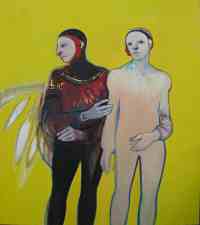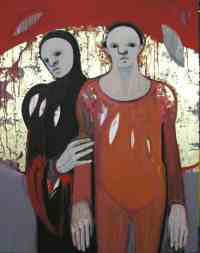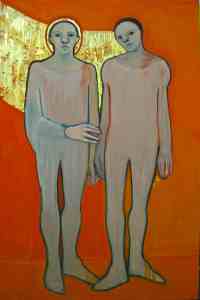Selina Trieff
by Robert Sievert

Selina Trieff:Sunlight, oil and gold leaf on canvas, 56 x 50", 2005


Selina Trieff: The Performer and the Monk, oil and gold leaf on canvas, 38 x 30", 2005


Selina Trieff: Sunset Angels, oil and gold leaf on canvas, 60 x 36", 2005

It's hard to imagine Selina Trieffs work as getting better, but it has.
Trieff has done the whole trip. Interweaving discipline with imagination she has gone through figuration and arrived at a state of accomplishment in which her work is both powerful figuration set in sophisticated abstract imagery.
In the 70’s Selina painted pictures of herself surrounded by her daughters. Strong figures powerfully outlined with a strong band of black. Her work had a painterly savvy and it seemed aligned to the "New York School of painting". Her work was unmistakably hers. You could tell it was one of her paintings from halfway down the block.
I have seen her shows over the years and there remains a familiarity with her ever expanding visual vocabulary. The paintings have acquired new aspects of finish, form and now with her current exhibit at George Billis Gallery she steps into full painterly maturity. The figures in her paintings are half clown, half mythical being, sort of genii. They exude a soulfulness and at the same time lock into a painterly security that is wonderful and rare. The figures are set into rich and elegant color, salmon pinks and deep crimson red that are sometimes mixed with areas of flat metallic paint. One of the strongest aspects of Trieff’s work is her use of color. The paintings sing with color.
All of this held together by an absolutely masterful drawing technique. The definition of each figure is in a varied emphatic line that eschews fussiness and detail in favor of the plastic unity of the entire picture. These are paintings to marvel at.
There is also an importance to this work as it clearly establishes a line of descendency from the abstract explosion of the last century to the contemporary painting scene of post modern twenty first century. To those of us who have struggled with the legacy of Hofmann, Resnik and other abstract masters, Trieff’s work is a clear statement that there is modernity in painting beyond the expressive splashes of the past
 back to Contents page
back to Contents page